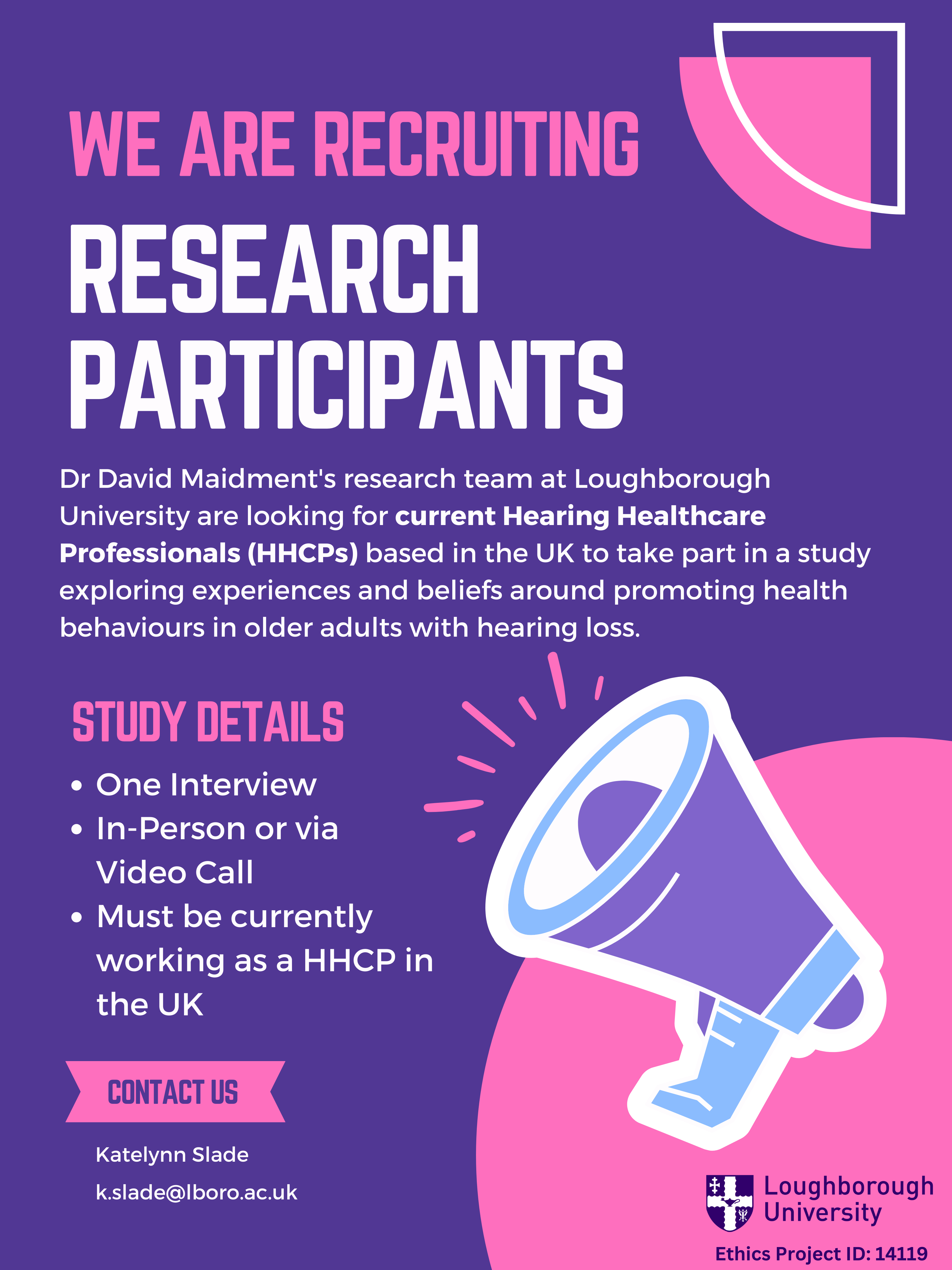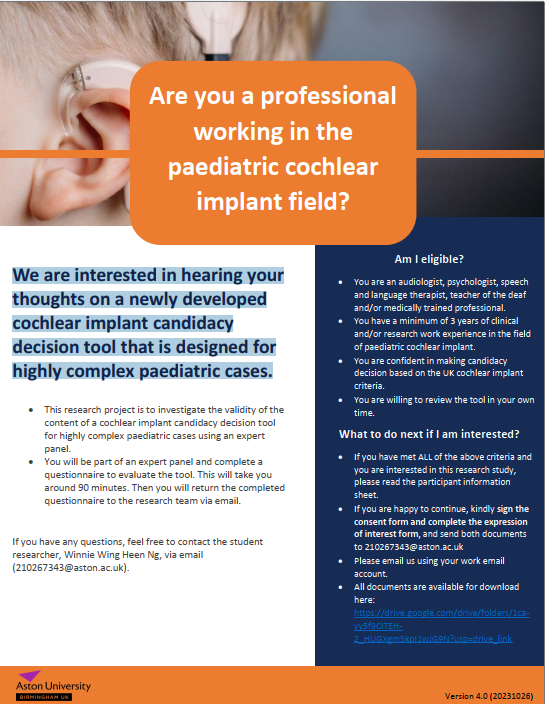Research projects that need your involvement
Research projects requesting your input
INTEGRATE is pleased to launch a national retrospective multicentre audit of current tinnitus pathways in the UK. This is an exciting opportunity to be involved in impactful, collaborative multi-centre research.
WHO?
This audit has been developed by INTEGRATE (The UK ENT Trainee Research Network) Otology subcommittee.
WHY?
Tinnitus is a common condition that can be difficult to manage clinically. Patients and clinicians can often be dissatisfied with current care pathways, and there can be wide variability in how patients are managed. We would like to gain insights into how patients with tinnitus are managed in the UK currently, in order to use this information to help both clinicians and patients get the most out of their care.
WHAT?
We need ENT, Audiology and Audiovestibular Medicine representatives from UK centres caring for patients with tinnitus. We ask you to submit data on the diagnostic pathway, management, and outcomes for patients presenting to your service. Full instructions and links to all the study documents can be found on the INTEGRATE website here. We will also be asking that a representative from each MDT completes a survey about their MDT.
Each centre can have a maximum of one local Site Lead and one Consultant, plus a maximum of ONE Collaborator within your department. Additional team members can be involved if you are collaborating across ENT / Audiology / Audiovestibular Medicine departments within your hospital, and this will be confirmed with the INTEGRATE team. Site Leads, Consultants and Collaborators will be acknowledged on all subsequent presentations and publications (as per INTEGRATE term of reference).
HOW?
To register and collaborate on this study, please complete the registration form (so we can stay in touch) and then follow instructions here. If you are a trainee-grade, we recommend that you get support from your consultant prior to registering. The data submission window is now open, and will close on 1st July 2024.
We very much look forward to collaborating with you on this study!
With best wishes,
INTEGRATE Otology subspecialty committee
We are conducting a study to better understand clinical practices around giving hearing aid patients advice about communication strategies. We are also interested in better understanding how effective this is in improving communication in the real world.
We are looking for practising audiologists who provide adult hearing rehabilitation, who are willing to complete a short online survey about their communication strategies counselling in the clinic.
The study will involve you completing an online questionnaire that will take no more than 15 minutes to fill in.
If you are interested in taking part or would like more information, please click here:
https://www.qualtrics.manchester.ac.uk/jfe/form/SV_0P94p2pEBjyXu74
or email gemma.perfect@manchester.ac.uk
Thank you
This study has been approved by the University of Manchester Proportionate Ethics Committee Ref. 2024-19466-33834
Hyperacusis research lead: Nighat Kalsoom.
This research is funded by the National Institute for Health Research (NIHR) and Health Education England (HEE).
Objectives: Hyperacusis is a hearing disorder characterised by a reduced tolerance or increased sensitivity to sound(s) that are perceived as normal to the majority of the population or were perceived as normal to the person before their onset of hyperacusis. The aim of this online national survey is to better understand current hyperacusis sound therapy intervention use across England in the adult population. The objectives are to establish how sound therapy intervention varies across the UK, to gather audiologists’ views on current use of sound therapy intervention and develop a standardised guideline for clinicians.
Instructions: Our survey contains 13 questions.
This questionnaire survey is aimed at adult-based audiologists only where treatment is related to adult patients (>18 years of age). Please answer all the questions below to your fullest knowledge and with honesty. All questionnaires are anonymous, and all responses will only be viewed by the above researcher. The survey findings will be summarised and disseminated.
Complete the survey here: Survey link
We would like to understand what healthcare practitioners know about deaf blindness/dual sensory impairment/multisensory impairment and how they change their practice to support children and young people with combined hearing and vision difficulties.
We would be extremely grateful if you could take a moment to complete this anonymous survey. You will be asked to answer questions on your awareness of deaf blindness/dual sensory impairment/multisensory impairment and how accessible your services are for people with combined hearing and vision difficulties.
Eligibility: Any healthcare professionals (NHS, private sector or General Ophthalmic Service) in the UK.
Time requirements: Approximately 15 minutes.
Confidentiality: No personal information is collected and your participation is anonymous. All information from your participation in this research will be collected and stored in accordance with the General Data Protection Regulation (GDPR, 2018).
Your rights: Participation in this study is voluntary and deciding not to participate will not affect you in any way.
For any questions: This study is being conducted by Dr Saima Rajasingam & Dr Eldre Beukes at Anglia Ruskin University in collaboration with Dr Peter Simcock at Birmingham City University. For any questions please contact saima.rajasingam@aru.ac.uk.
Ethical Approval: Faculty Research Ethics Panel of Anglia Ruskin University (FREP/SREP number: ETH2122-0807)
Survey link: https://aruspsych.eu.qualtrics.com/jfe/form/SV_23M3R1dTl04yyIm
Aston University Student, Charlotte White, is currently recruiting audiologists for a masters project as part of the Scientist Training Programme. The title is ‘Exploring the future of remote care for adults with hearing aids within the UK’.
The aim of the study to gather a range of audiology clinicians’ perspectives and views on remote fine tuning of hearing aids. By obtaining data on the current views and experiences of remote fine tuning, the aim is to use this to build knowledge of the current landscape and inform future use of remote fine tuning. If this study can enable remote fine tuning to be used more successfully, patients can receive greater access to care. To this end, as an audiologist who has experience fitting hearing aids to adults within the NHS, we would like to invite you to an online semi-structured interview lasting approximately 45 minutes. As we want to gather a range of perspectives, we are looking for clinicians either with OR without experience in remote fine tuning.
If you wish to take part or have any questions, please email Charlotte at 210271878@aston.ac.uk
The aim of my project is to investigate the validity of the content of a cochlear implant candidacy decision tool for highly complex paediatric cases using an expert panel, which will be formed by a group of professionals who have had experience in the field of paediatric cochlear implant. These individuals would be invaluable contributors and play a crucial role in evaluating the decision tool.
We are interested in hearing your thoughts on a newly developed cochlear implant candidacy decision tool that is designed for highly complex paediatric cases.
This research project is to investigate the validity of the content of a cochlear implant candidacy decision tool for highly complex paediatric cases using an expert panel.
You will be part of an expert panel and complete a questionnaire to evaluate the tool. This will take you around 90 minutes. Then you will return the completed
questionnaire to the research team via email.
Am I eligible?
You are an audiologist, psychologist, speech and language therapist, teacher of the deaf and/or medically trained professional.
You have a minimum of 3 years of clinical and/or research work experience in the field of paediatric cochlear implant.
You are confident in making candidacy decision based on the UK cochlear implant criteria.
You are willing to review the tool in your own time.
What to do next if I am interested?
If you have met ALL of the above criteria and you are interested in this research study, please read the participant information sheet.
If you are happy to continue, kindly sign the consent form and complete the expression of interest form, and send both documents to 210267343@aston.ac.uk
Please email us using your work email account.
All documents are available for download here:
https://drive.google.com/drive/folders/1cayy5f9CITEH2_HUGXgm5kpI1wJG9N?usp=drive_link
If you have any questions, feel free to contact the student researcher, Winnie Wing Heen Ng, via email (210267343@aston.ac.uk).
“Dr David Maidment and his research team at Loughborough University are looking to recruit current UK-based hearing healthcare professionals (HHCPs) and older adults (at least 45 years old) with hearing loss to take part in a 1-1 interview in-person or via Teams to share their perspectives and experiences around the promotion of healthy behaviours in adults with hearing loss. This research study aims to address the limitations of the existing evidence base by exploring the perceptions, experiences, and beliefs of both HHCPs and adults with hearing loss regarding the links between hearing and health. If you are interested in taking part or would like more information, please contact Katelynn Slade, Research Associate, at k.slade@lboro.ac.uk.”

As part of my Advanced Audiology MSc, I invite you to participate in my research project. Clinical experiences of children needing adaptive behavioural testing
It has been suggested there has been a need for a change in adaptive behavioural assessment in paediatric clinic to obtain behavioural responses over the last 5 years. The aim of my study is to seek audiologists’ views on this theory and what their experience has been.
I will be conducting 30 minute interviews via Zoom to record your thoughts and experiences.
If you would like to be involved and help me with my research or to find out more information then please email me zoe.porter@postgrad.manchester.ac.uk.
Ethics approval obtained through University of Manchester Ref:2023-17602-30504
We are looking for audiologists in the United Kingdom to participate in a survey to investigate the attitudes of audiologists towards teleaudiology. Your feedback is essential to identifying teleaudiology service barriers and facilitators and enhancing patient access to hearing healthcare.
To take part, you must:
● Be a registered audiologist with a full license to work in the UK without any restrictions in practice.
Teleaudiology is a way to provide hearing care services remotely. Despite the potential benefits of teleaudiology, its adoption by audiologists has been unexplored, so it is necessary to better understand the attitudes of audiologists towards this emerging technology. By participating in this survey, you can help us determine the elements that affect audiologists’ attitudes towards teleaudiology, and provide information for the progress of teleaudiology services.
The study would be conducted at the University of Manchester, United Kingdom. You will be asked to complete the questionnaire, which consists of four sections. The survey would take approximately 20 minutes to complete.
Please follow the link below to participate in the survey:
Click here to find out more or scan the QR code

David Jay is an audiologist at Manchester Royal Infirmary. He is undertaking a short survey to understand how UK audiology clinics use the Video Head Impulse Test (vHIT). This involves five short questions and is aimed at clinical leads for vestibular services in NHS audiology centres. The data gathered will not be published, but may inform a section of a lecture given at this year’s BAA conference aiming to summarise the last ten years of vHIT research development and clinical practice. Please spare a few minutes to help. Thank you!
Access the Survey here or scan the QR code below

We would like to invite you to participate in a study conducted by the UCL Ear Institute. We are aiming to explore what paediatric audiologists in the UK currently do to validate hearing aid fittings in children with unilateral hearing loss including the challenges and barriers they face.
Are you a paediatric audiologist working with children in the UK? If so, please participate in our anonymous survey exploring your practices for fitting and validating hearing aids for children with unilateral hearing loss. You can also leave your email address to enter a prize draw to win a £50 shopping voucher.
This project is part of an MSc project being conducted by the UCL Ear Institute, and it has been reviewed and approved by UCL Research Ethics Committee (12585/011).
The link to the survey is here: https://qualtrics.ucl.ac.uk/jfe/form/SV_ezYu35NfeOByAIe
Thank you for your help.
Best wishes,
Aanisah Razaq, Hannah Cooper, Amanda Hall and Marsha Jenkins
UCL Ear Institute
You have been invited to participate in a research project investigating healthcare professionals’ attitudes towards artificial intelligence (AI) in ear and hearing health. As a practicing GP, audiologist, ENT specialist, ENT SAS grade doctor, or trainee in these fields, your experiences are crucial in understanding the factors that affect perception of AI in hearing health. This research is funded by Health Education England and will contribute towards the award of a doctoral research degree.
Please follow this link to take a survey (Take the Survey), which should take around 10-12 minutes to complete. You will only be required to participate only once in the survey cycle before it closes on 30th April 2023.
The Participant Information Sheet contains more detailed information about the study, details how you were selected and covers confidentiality safeguards.
Your participation is valued and confidential.
Please do not hesitate to contact me if you have any questions at: babatunde.oremule@postgrad.manchester.ac.uk
Kind regards,
Tunde
Mr Babatunde Oremulé
Specialty Registrar in ENT, Head & Neck Surgery, Royal Manchester Children’s Hospital
PhD Candidate, Division of Infection, Immunity and Respiratory Medicine, School of Biological Sciences, Faculty of Biology, Medicine and Health, University of Manchester.
Follow this link to the Survey: Take the Survey
Or copy and paste the URL below into your Internet browser:
https://www.qualtrics.manchester.ac.uk/jfe/preview/previewId/945d3028-0391-47f2-8013-93dcd8f65e79/SV_d1rwhDLBLJsHg8e?Q_CHL=preview
Scan the QR code to the Survey:

We are conducting focus groups to explore the impact of lived experience of hearing loss (D/deafness) on the role of a hearing care professional, to understand the challenges surrounding work, what support they have received, and their priorities for the profession.
If you are a hearing care professional with hearing loss (D/deafness), we would value your participation in this 90 minute focus group on MS teams.
Saima Rajasingam is conducting this study in collaboration with Joanne Smith (co-I with lived experience of hearing loss).
For more information, please email: saima.rajasingam@aru.ac.uk
Thank you for your help with this study.
A team from the University of Nottingham is looking for parents to take part in an interview or complete an online questionnaire about their children’s experiences of sound-sensitivity (hyperacusis). The data will be used to develop a child-tailored measure of hyperacusis to support clinicians and enable future research trials on treatments. Can you help by sharing this with parents?

